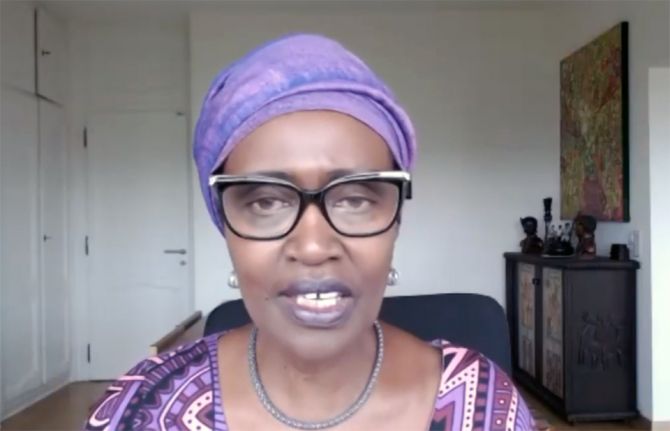

Press Release
World Health Assembly: UNAIDS urges leaders to tackle inequalities and fully embrace human rights to beat emerging pandemics
24 May 2022 24 May 2022GENEVA, 24 May 2022— At the seventy-fifth World Health Assembly, taking place in Geneva, Switzerland, UNAIDS has urged leaders to tackle the global inequalities that drive pandemics such as HIV and COVID-19. UNAIDS highlighted that respect for everyone’s human rights is essential for achieving health for all.
In her address to the World Health Assembly today, the UNAIDS Executive Director, Winnie Byanyima, urged leaders to urgently prioritize the investments needed to stop the AIDS pandemic as well as better prepare the world for future pandemics and ensure health security for everyone.
“The world remains dangerously unprepared to stop today’s pandemics or prevent those of the future because we lack effective plans to ensure access to health technologies and finance trusted community-led organizations for pandemic response,” said Ms Byanyima. “We can beat pandemics and we can protect the health of all if we are bold in tackling inequalities, if we place human rights at the centre of our response.”
Ms Byanyima’s speech touched on three main areas of pandemic preparedness: access, financing and communities.
Communities: to defeat pandemics and protect the health of all people, we need sufficiently financed community-led organizations providing services, doing outreach and providing trusted information as an integral part of the public health response. Communities, who know the situation on the ground best and have the essential relationships of trust, need to be given the resources and the space to lead.
Access: to end AIDS, beat COVID-19 and stop the pandemics of the future, global access to life-saving, pandemic-ending health technologies is critical. We need to replace intellectual property rules that restrict access to life-saving medicines for people in the Global South with those that require technology sharing. This would open up access to COVID-19 vaccines and treatments and to new emerging long-acting medicines for HIV prevention and treatment, as well as for medicines for other pandemics.
Financing: our collective health security, and the effectiveness of global pandemic responses, requires that we adequately finance them. This includes fully funding the Global Fund to Fight AIDS, Tuberculosis and Malaria. This means too that low- and middle-income countries need to be able to increase health investments through progressive domestic resource mobilization and international solidarity, not be shackled by debt or marginalized in the allocation of the International Monetary Fund’s Special Drawing Rights.
During the World Health Assembly, UNAIDS applauded the progress made in developing a new pandemic preparedness and response instrument and submitted that it should include the following essential substantive elements:
- Placing human rights at the core of pandemic responses.
- Putting communities at the centre, including participation in pandemic preparedness and response architecture at the national, regional and global levels.
- Ensuring access to health technologies and medical countermeasures as public health goods to allow equitable access by all those in need.
- Building people-focused data systems capable of highlighting inequalities.
- Supporting the health workforce, including community health workers on the pandemic front lines.
UNAIDS also warmly congratulated Tedros Adhanom Ghebreyesus on his reconfirmation as Director-General of the World Health Organization during the World Health Assembly. “Congratulations my brother Tedros! We look forward to continuing our work together to ensure health for all,” said Ms Byanyima.
UNAIDS
The Joint United Nations Programme on HIV/AIDS (UNAIDS) leads and inspires the world to achieve its shared vision of zero new HIV infections, zero discrimination and zero AIDS-related deaths. UNAIDS unites the efforts of 11 UN organizations—UNHCR, UNICEF, WFP, UNDP, UNFPA, UNODC, UN Women, ILO, UNESCO, WHO and the World Bank—and works closely with global and national partners towards ending the AIDS epidemic by 2030 as part of the Sustainable Development Goals. Learn more at unaids.org and connect with us on Facebook, Twitter, Instagram and YouTube.
